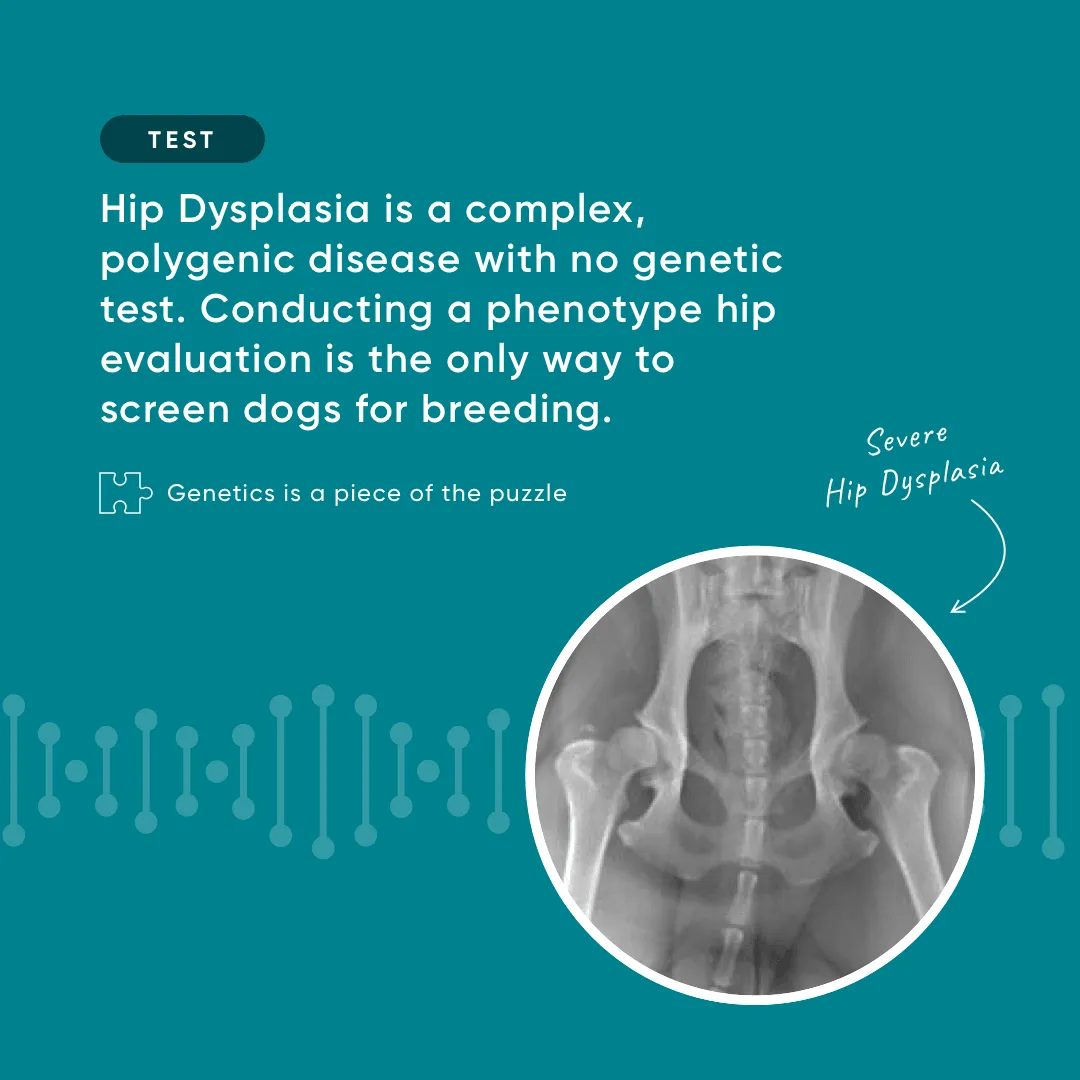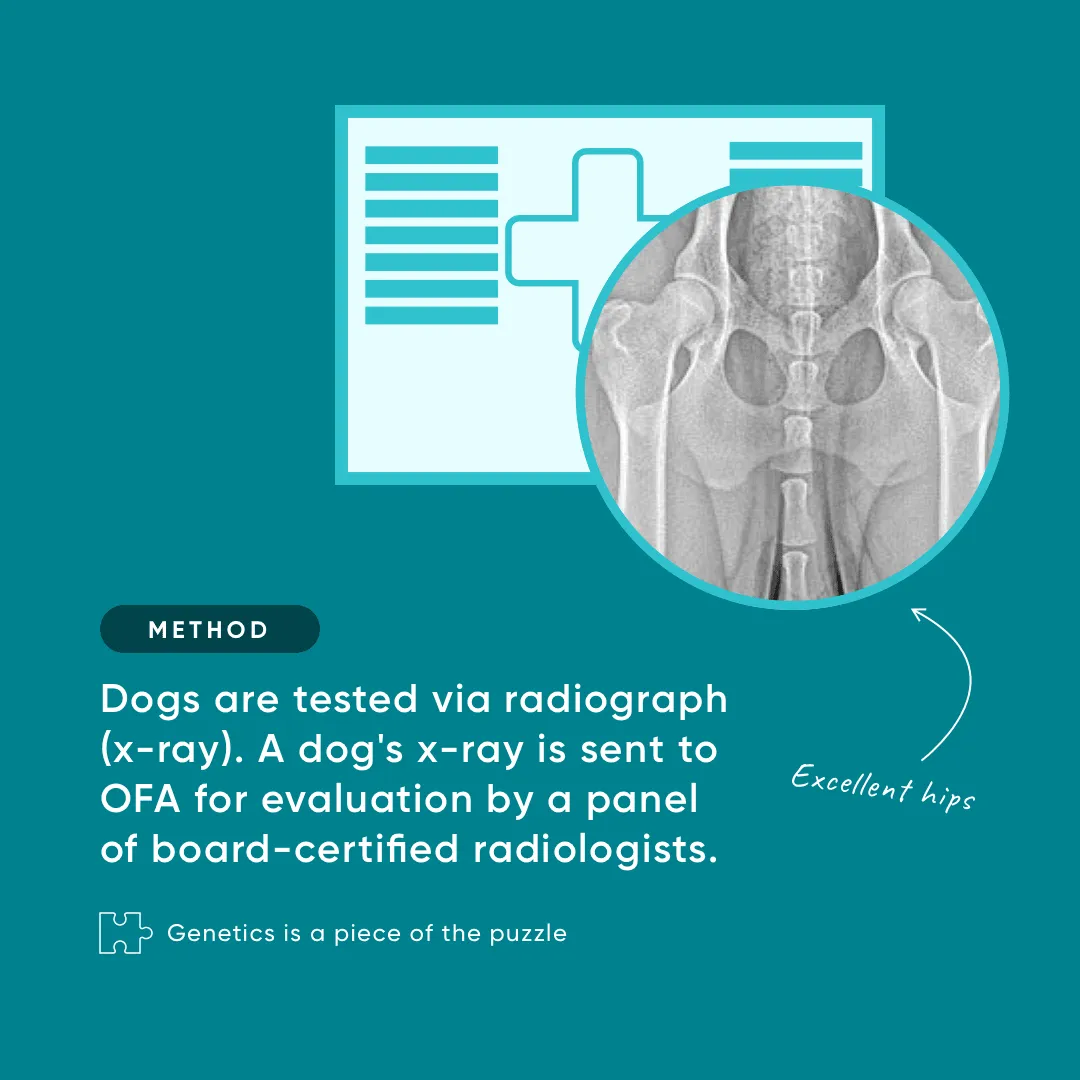In the evolving world of canine health, many dog owners and breeders understandably seek every advantage to ensure their furry companions lead long, healthy lives. With the rise of genetic testing, it’s common to wonder about a “Dna Test For Hip Dysplasia In Dogs.” However, when it comes to canine hip dysplasia, the answer isn’t as straightforward as a simple DNA test. This complex condition, while having a genetic component, is currently evaluated through phenotypical examinations rather than a direct genetic marker. Understanding the nuances of hip dysplasia testing is crucial for responsible breeding and ensuring the well-being of future generations of dogs.
Hip dysplasia is a polygenic disease, meaning it’s influenced by multiple genes, making a single DNA test impossible with current technology. Instead, comprehensive health screening for dogs, especially those intended for breeding, involves a combination of genotypic (DNA tests for specific conditions) and phenotypical (physical examinations) evaluations. While DNA tests are available for over 270 other genetic health conditions that can be registered with the Orthopedic Foundation for Animals (OFA), hip dysplasia remains a condition assessed through physical means. This article will delve into canine hip dysplasia, its current testing methods, and what breeders should prioritize for optimal canine health.
Understanding Canine Hip Dysplasia: A Complex Condition
Canine hip dysplasia is a developmental orthopedic disease characterized by an abnormal formation of the hip joint. This abnormality leads to a loose fit of the femoral head (the ball) within the acetabulum (the socket), a condition known as laxity. Over time, this instability causes the cartilage and bone to degrade, resulting in pain, inflammation, and degenerative joint disease (osteoarthritis).
The causes of hip dysplasia are multifaceted, involving a complex interplay of genetics, environmental factors, and lifestyle. While certain breeds are genetically predisposed (often larger breeds), factors such as rapid weight gain from overfeeding, excessive or inappropriate exercise during growth, and trauma can exacerbate the condition. Some dogs with severe hip dysplasia might show no overt symptoms, while others with milder cases can exhibit lameness, a “bunny-hopping” gait, difficulty rising, reluctance to jump, or a decrease in activity. Early detection and understanding the condition are key to managing its progression and impact on a dog’s quality of life. Owners of smaller breeds should also be aware of joint health, as maintaining a healthy weight can prevent issues, a topic explored further in understanding heart healthy dog food for small dogs.
The Gold Standard: Phenotypical Hip Evaluation
Since a direct DNA test for hip dysplasia in dogs doesn’t exist, a physical hip evaluation through radiography (X-ray) is the only reliable method to screen dogs prior to breeding. This phenotypical assessment allows veterinarians to visually inspect the hip joint’s structure and stability.
 X-ray image showing the skeletal structure of a dog's hips with markers
X-ray image showing the skeletal structure of a dog's hips with markers
The X-ray Procedure
For accurate evaluation, X-rays must be taken precisely. Veterinarians typically follow the American Veterinary Medical Association (AVMA) guidelines for positioning. The dog is placed on its back (dorsal recumbency) with its rear legs fully extended and parallel, and the knees rotated internally to ensure the pelvis is symmetrical. Anesthesia or heavy sedation is often recommended to achieve optimal muscle relaxation, which is crucial for proper positioning and to reveal any underlying joint laxity. It’s important to note that pregnant females or those in estrus should not be X-rayed for hip evaluation, as hormonal fluctuations can temporarily affect hip joint laxity, potentially leading to inaccurate results.
Once the X-rays are properly taken and identified, along with the necessary OFA application, they are submitted to the Orthopedic Foundation for Animals. A panel of board-certified radiologists then meticulously evaluates the radiographs to determine the dog’s hip status. Proper health testing is paramount for all dogs, including specific breeds like Chihuahuas, where considerations like the best dog food for chihuahuas are part of overall wellness.
Age Requirements for OFA Evaluation
To receive a permanent hip evaluation from the OFA, dogs must be at least 24 months old. This age ensures that the hip joints have reached their full mature development, providing the most accurate assessment of their long-term health. Preliminary evaluations can be submitted for dogs between 4 and 23 months of age. While preliminary results can offer early insights, they are not considered final for breeding purposes.
 Diagram illustrating canine hip dysplasia with a loose femoral head in the hip socket
Diagram illustrating canine hip dysplasia with a loose femoral head in the hip socket
Deciphering OFA Hip Ratings
After review by the OFA, a dog’s hips are classified into several categories, ranging from normal to severely dysplastic. These ratings provide breeders with critical information about the structural integrity of the dog’s hip joints.
Normal Categories
- Excellent: This is the highest rating, indicating a nearly perfect hip joint with a tightly fitting femoral head deep within a well-formed acetabulum, showing minimal joint space.
- Good: Hips are well-formed and congruous, with good coverage of the femoral head by the acetabulum, but are not as ideal as “Excellent.”
- Fair: These hips show minor irregularities, such as a slightly wider hip joint space or a femoral head that might not fit as snugly into the socket.
Dogs receiving an “Excellent,” “Good,” or “Fair” rating are considered to have normal hips and are issued an OFA registration number, signifying they are suitable for breeding concerning hip health.
 Close-up X-ray view of a dog's hip joint, showing detailed bone structure
Close-up X-ray view of a dog's hip joint, showing detailed bone structure
Borderline and Dysplastic Categories
- Borderline: This category signifies that while some inconsistencies are present, there aren’t yet definitive arthritic changes that would classify the hips as dysplastic. OFA recommends re-evaluating these dogs later.
- Mild Dysplasia: Characterized by significant subluxation, where the femoral head is partially out of the socket.
- Moderate Dysplasia: In these cases, the hip socket is very shallow, with the femoral head barely resting within it, and early arthritic changes are evident.
- Severe Dysplasia: The most critical rating, indicating the femoral head is almost completely out of a very shallow socket, accompanied by extensive secondary arthritic changes such as remodeling of bone, bone spurs, and significant joint degradation.
Dogs with any level of dysplasia are generally not recommended for breeding due to the high likelihood of passing on the condition to their offspring. Ensuring your dog’s joint health also involves proper nutrition, which can be found in discussions about the best dog food for weiner dogs.
Beyond Hip Dysplasia: The Role of Genetic Testing
While the quest for a “dna test for hip dysplasia in dogs” continues to be a subject of research, it’s vital to remember that genetic testing plays an indispensable role in responsible breeding programs for countless other conditions. The Orthopedic Foundation for Animals (OFA) is a leading canine health registry, maintaining a public database of health testing results, including hip evaluations. Additionally, companies like Embark offer comprehensive DNA testing for over 270 genetic health conditions, many of which are also registrable with the OFA.
These genetic tests identify carriers or at-risk individuals for diseases such as progressive retinal atrophy, von Willebrand’s disease, and various heart conditions. By testing both parents, breeders can make informed decisions to avoid producing puppies affected by these hereditary diseases. A holistic approach to canine health testing combines both phenotypical evaluations like OFA hip certifications and comprehensive genotypic screenings to ensure the healthiest possible puppies. Addressing specific health concerns like heartworm also requires careful dietary consideration, as detailed in resources about the best dog food for heartworm positive dogs.
Conclusion
Understanding “dna test for hip dysplasia in dogs” requires clarity: currently, there is no direct DNA test for this complex, polygenic condition. Instead, responsible breeding relies on rigorous phenotypical evaluations, primarily through OFA-certified hip X-rays. These evaluations provide critical insights into the structural health of a dog’s hips, allowing breeders to make informed decisions to mitigate the prevalence of hip dysplasia. Simultaneously, leveraging comprehensive DNA testing for other genetic health conditions is paramount for ensuring the overall health and vitality of a breeding program. By combining physical examinations with advanced genetic screening, breeders can strive to produce healthy, happy puppies, fulfilling their commitment to canine well-being. Additionally, maintaining good oral hygiene can also contribute to overall health; learn more about what is the best dog treat for bad breath.
References
- Orthopedic Foundation for Animals (OFA): https://www.ofa.org/
- Embark Veterinary: https://embarkvet.com/
